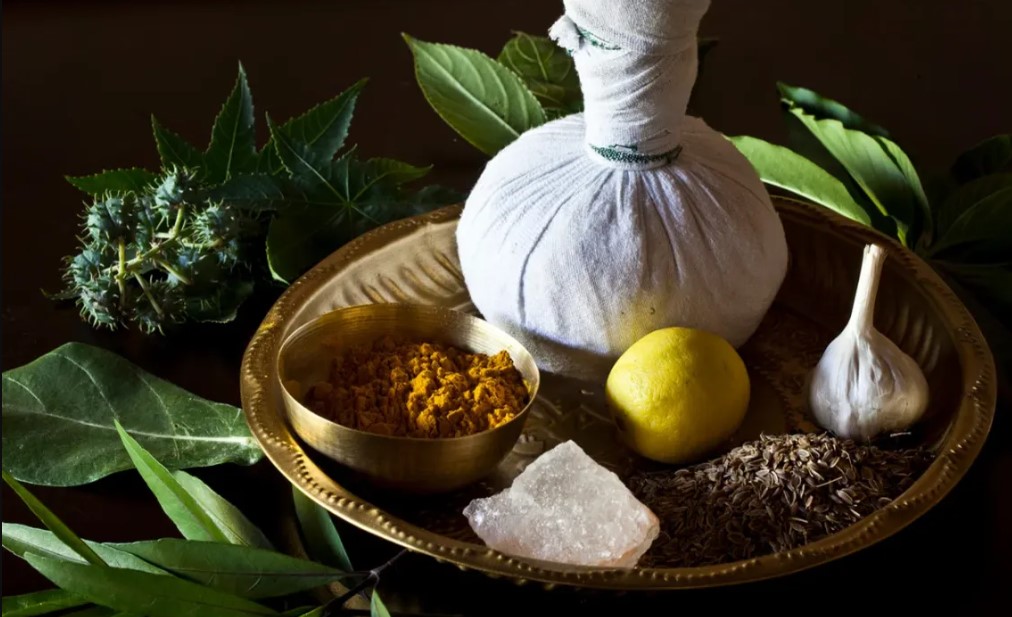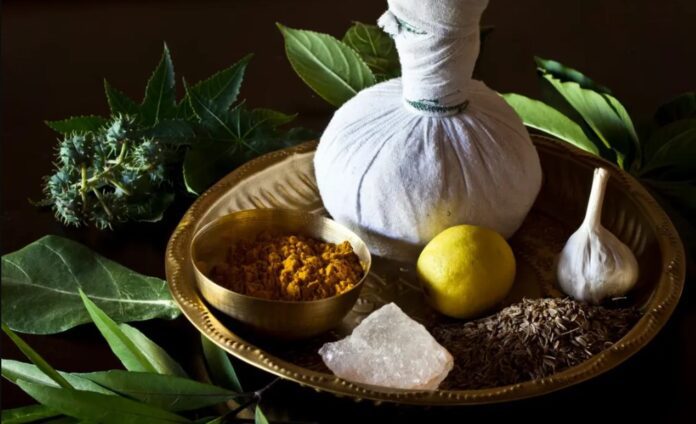Elevated cholesterol levels pose a significant risk factor for atherosclerosis, the hardening of coronary arteries due to plaque buildup. This condition can lead to restricted blood flow, heart disease, heart attacks, and strokes. Over 95 million Americans have cholesterol levels exceeding 200 mg/dL, influenced by factors such as genetics, diet, smoking, and body weight. While cholesterol medications like statins are commonly used, some individuals explore alternative treatments, including Ayurvedic medicine.
Ayurveda, one of the world’s oldest medicinal systems, employs diet, behavioral adjustments, and supplements. And detoxification methods to promote overall health and disease prevention. However, the safety and efficacy of Ayurveda are often questioned in scientific studies.
This article assesses whether Ayurvedic medicine is effective in reducing cholesterol levels.

Ayurvedic Approaches to High Cholesterol:
Contemporary treatments for high cholesterol typically involve lifestyle changes and cholesterol-lowering medications like statins. In contrast, Ayurvedic treatments encompass dietary restrictions, massage, yoga, breathing exercises, behavior modifications, exercise, detoxification, heat therapy, enemas, and herbal supplements. Ayurvedic practitioners customize treatment plans based on individual needs.
Research indicates that specific Ayurvedic practices, such as dietary adjustments, supplements, and stress reduction, can lower cholesterol levels and improve overall health.
Ayurvedic Supplements for High Cholesterol:
Ayurvedic medicine employs medicinal herbs to address high cholesterol, with commonly used herbs including garlic, guggul (Commiphora mukul), and arjuna (Terminalia arjuna). These herbs are often combined with ingredients like turmeric, ginger, shilajit, licorice, Pushkarmool (Inula racemosa), Cyperus rotundus, Tribulus terrestris, punarnava (Boerhaavia diffusa), Nigella sativa, garcinia, triphala, and others to create Ayurvedic formulations.
Ayurvedic medications are available in various forms, including juices, powders, tablets, extracts, and concentrated herbal preparations known as decoctions.
Effectiveness of Ayurvedic Remedies for Lowering Cholesterol:
Research suggests that certain Ayurvedic approaches may effectively reduce cholesterol levels. These approaches include dietary modifications, emphasizing a lower intake of fat and calories. Ayurvedic dietary patterns encourage whole, unprocessed foods, particularly plant-based options while discouraging processed foods.
Stress reduction, exercise, mindfulness techniques, yoga, breathing exercises, and heat therapy are additional Ayurvedic treatments that research indicates may help lower total and LDL (bad) cholesterol levels.
Studies also suggest that common Ayurvedic herbs and herbal combinations can lower cholesterol levels. For instance, arjuna powder, taken in combination with arogyavardhini vati, significantly reduced total and LDL cholesterol while increasing HDL (good) cholesterol in one study.
Another herbal mixture, Mustadi Ghanavti, containing ingredients like turmeric, was found to reduce total cholesterol by 22.4% and LDL cholesterol by 18.2% while increasing HDL cholesterol by 5.6% in a study of people with high cholesterol.
Ashwagandha (Withania somnifera), another Ayurvedic herb, may also help lower cholesterol levels according to a study showing significant reductions in total cholesterol with Ashwagandha supplementation.
While these findings are promising, larger, high-quality studies are needed.
Potential Drawbacks:
Although certain Ayurvedic practices are generally safe, herbal supplements may have side effects, including diarrhea, abdominal cramps, hallucinations, weakness, skin rashes, and headaches. Moreover, many herbs can interact with commonly prescribed medications like blood thinners, blood pressure drugs, and antibiotics.
To ensure safety, it is crucial to consult with a healthcare provider before incorporating Ayurvedic herbal remedies into your routine. Especially if you are taking medications. Additionally, Ayurvedic dietary recommendations may be overly restrictive, which may not be necessary for individuals solely seeking to reduce cholesterol levels.
Evidence-Based Methods to Lower Cholesterol:
While Ayurvedic treatments may help lower cholesterol, other evidence-based strategies may be more effective:
- Increase Fiber Intake: Consuming more fiber, particularly soluble fiber from sources like beans, fruits, flax, and oats, is a proven method to reduce cholesterol levels.
- Weight Loss: Shedding excess body weight, even a modest 5-10%, can significantly lower total and LDL cholesterol.
- Plant-Based Diet: Incorporating more vegetables and fruits into your diet can reduce LDL cholesterol levels and lower the risk of heart disease.
- Physical Activity: Regular exercise can decrease LDL cholesterol while increasing HDL cholesterol.
- Mediterranean Diet: Adopting a Mediterranean diet, rich in olive oil, seafood, vegetables, nuts, and beans, is associated with improved heart health, lower LDL cholesterol, and higher HDL cholesterol.
- Limit Processed Foods and Added Sugar: Reducing consumption of processed foods and added sugar is linked to a lower risk of heart disease and elevated LDL cholesterol levels.
Additionally, quitting smoking and considering supplements such as curcumin and omega-3 fats may also help lower cholesterol levels.
Remember that cholesterol levels can be influenced by factors beyond diet, physical activity, and weight, including genetics. If you need guidance on safely reducing cholesterol levels, consult with your healthcare provider.
7 Natural Remedies for High Cholesterol
Natural remedies for heart disease aim to manage cholesterol levels and reduce blood pressure, but the scientific evidence supporting their effectiveness is limited. While some individuals have reported success, conventional treatments may still be the preferred choice.
Few natural products have undergone sufficient research to conclusively demonstrate their clinical ability to lower cholesterol.
Nevertheless, certain cholesterol-lowering supplements and natural remedies have shown potential benefits, and some people have experienced positive results with alternative treatments.
Before considering any alternative treatments, it is crucial to consult a healthcare professional to ensure their safety for your specific circumstances. Some ingredients in alternative therapies can interact with medications or lead to adverse effects.
-
Astragalus:
- Astragalus is an herb commonly used in traditional Chinese medicine to support the immune system. It possesses antibacterial and anti-inflammatory properties and is considered an “adaptogen,” believed to protect the body against various stresses.
- Limited studies suggest potential heart benefits of astragalus, although high-quality clinical human trials are generally lacking. According to the National Center for Complementary and Integrative Health (NCCIH). Further research is needed to establish its impact on cholesterol levels and overall heart health.
-
Hawthorn:
- Hawthorn is a shrub related to the rose family, and its berries, leaves And flowers have historically used in treating heart conditions since the Roman Empire.
- While some studies indicate its effectiveness in treating mild heart failure, research results are conflicting, as cautioned by the NCCIH. There is insufficient scientific evidence to support its efficacy for other heart problems.
- Additionally, hawthorn may interact negatively with various prescription medications and other herbs.
-
Flax Seed:
- Flax seeds, derived from the flax plant, and flaxseed oil are rich in alpha-linolenic acid (ALA), an omega-3 fatty acid that may reduce the risk of heart disease.
- Flaxseed research shows mixed results; some studies indicate potential cholesterol reduction, especially in high-cholesterol and postmenopausal individuals.
-
Fish Oil Supplements with Omega-3 Fatty Acids:
- Omega-3 fatty acids are present in fish and fish oils, with fatty fish like salmon, tuna, and herring being rich sources.
- Consuming omega-3-rich fish is more strongly supported for lowering heart disease risk than using supplements or other omega-3 foods.
-
Red Yeast Rice:
- Red yeast rice, a traditional Chinese medicine and cooking ingredient, is created by fermenting red rice with yeast.
- Some red yeast rice products contain monacolin K, chemically identical to the cholesterol-lowering drug lovastatin, which can help reduce blood cholesterol levels.
- However, product variability makes it challenging to identify effective and safe options.
-
Plant Sterol and Stanol Supplements:
- Plant sterols and stanols are natural substances present in various plants and are also found in fortified foods like margarine, orange juice, and yogurt.
- These compounds may lower heart disease risk by reducing the absorption of cholesterol in the small intestine.
-
Garlic:
- Garlic, both consumed raw or as a supplement, has a history of use in cooking and traditional medicine.
- Some research suggests that garlic may help lower blood pressure, reduce blood cholesterol levels, and slow the progression of atherosclerosis. However, results from studies are mixed.

In addition to these natural remedies, adopting a healthy lifestyle can effectively manage cholesterol levels:
- Quit smoking if you are a smoker.
- Maintain a healthy weight for your body type.
- Engage in regular physical activity.
- Include heart-healthy foods rich in soluble fiber and omega-3 fatty acids in your diet.
- Limit saturated fats, opting for healthier alternatives like olive oil.
- Eliminate trans fats from your diet.
- If you consume alcohol, do so in moderation.
- Manage stress through relaxation techniques.
Medications, such as statins, cholesterol absorption inhibitors, and injectable medications, are also available to lower high cholesterol levels.
Summary
cholesterol management is essential for heart health. While natural remedies offer potential benefits, their efficacy varies, and some may pose risks or interact with medications. Consultation with a healthcare professional is crucial to determine the most appropriate approach for your cholesterol management. Lifestyle changes and prescription medications remain vital components of cholesterol control.https://en.wikipedia.org/wiki/Cholesterol


